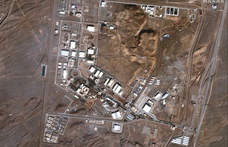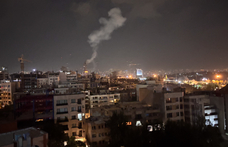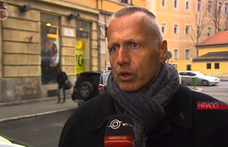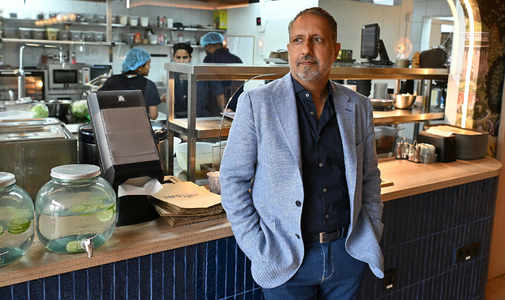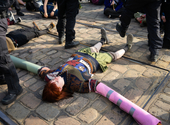Szofia Havas, President Solyom, and the 1956 inheritance
Another 1956 anniversary is approaching. The extreme right wants to provoke a new round of street fighting, if not on 23 October, then a couple of days later, on the anniversary of the taxi blockade. There will be a rally at Astoria in memory of 23 October 2006.
In her interview with HVG, Szofia Havas has repeated her opinion that 1956 was no revolution. Rather, she says, armed people hunted Jews in the city. It's easy to forget: in 1989, 1956's ideals became reality, and neither side can appropriate that achievement for itself.
French sociologists and historians have shown that voters in elections between the two world wars were influenced by the position their ancestors had taken during an uprising in the Vendee region. In the late 1930s, when the political struggle over the Popular Front was polarising French public opinion, and when 14 July had been a national celebration for 60 years, family memories remained, and if great-grandfathers had taken up arms against the First Republic, their descendants were certainly not voting for the Social Democrat Leon Blum.
The 1956 revolution left a similar mark in Hungarians, although it's hard to translate the effect into precise political terms. The traces are so strong that even MPs can't quite control their tongues, deviating dangerously from the party line. Szofia Havas, a doctor and healthcare specialist who has recently been sworn in as a Socialist MP, is the niece of Gyula Horn, the former prime minister. Earlier in October, she said in an interview with HVG, "I don't refer to 1956 as a revolution, because I can't describe Arrow Cross members who escaped from jail as revolutionaries. Nor can I accept that description of young people with machine guns, people who were searching from house to house just like people did in 1944 when hunting down Jews."
Many left-wing voters experienced 1956 in just this way, or at least inherited this image of the revolution from their parents, and to this day their convictions are based on those subjective feelings. In Szofia Havas's case, it's true that her father, a follower of Kadar, was killed in unclear circumstances. There are some indications that the revolutionaries did it, though other sources suggest he was run over by a Soviet truck. Such experiences are deeply engraved into people's souls, and they can't be erased by rational arguments. People who responded to an anti-Semitic remark or a broken window by seeing the shadow of the Holocaust over the days of the revolution were very susceptible to later Kadarist propaganda. Even today, they are immune to the arguments that in Budapest, where most Jews lived, not one single serious attack on Jews took place between 23 October and 4 November 1956 and that the Arrow Cross made no public appearance.
Szofia Havas was harshly criticised by the Socialist Party's 1956 group, which includes Imre Mecs, a former revolutionary who survived despite receiving a death sentence, and Laszlo Donath, who was associated with Imre Nagy, the martyr prime minister. So 1956 is still a divisive subject among MPs, even if many deny this. Gyula Horn's remarks last year to a German paper, in response to which the president refused to accord him the highest honour on his 75th birthday, underline this. How many members of the Socialist parliamentary group must have similar feelings about the "small October revolution"? How many must feel the same as the old lady who told Klubradio last autumn that "the same people are rioting in the streets as did in 1956!"
The Right also has a figure who was sentenced to death for her role in 1956, in the person of Maria Wittner. Unlike Mecs with his "democratic Socialist" interpretation, she follows and promotes an anti-communist view. There is a chance that events 50 years later will finally tip the balance between the two interpretations. Participants in the Fidesz rally held on the 50th anniversary were subject to police attacks under circumstances that have still not been cleared up, caught up in a police charge that started seconds after the official end of the rally. Videos of illegal brutality confirmed to part of the public that, like in 1956, right and truth were on the side of the public, not the police. Fidesz is ramming home this message by holding its rally at Astoria, just as it did a year ago. The aim of the repeat is to evoke the violence of the 50th anniversary, appropriating the revolution for its side. We hope the organisers will manage to keep the Magyar Garda and the Arpad Flag Jobbik militants away from the event. But Viktor Orban will certainly dwell on the parallels between 1956 and 2006.
The Left mustn't get caught up in this, because 1956 cannot be tied to a single political camp. Fifty-one years ago, the moderate Left and the moderate Right were clearly at one in demanding democracy and political pluralism, and they shouldn't be celebrating separately today. Laszlo Solyom, the president, makes statements that are invariably interpreted by the two camps according to their own tastes, but the majority must agree that today's political system cannot be separated from 1956.
While the president thinks it important to emphasise the differences between 1956 and 1989 ("the new, democratic system was not created by revolution but by negotiations on a peaceful transition conducted by the opposition and the Hungarian Socialist Workers' Party that crushed the revolution in 1956"), he also emphasises the parallels. Saying, for example, that "the reform communist intellectuals played an important role in preparing the changes," and that "the main demands of 1956 were met in 1989 and 1990."
Probably, most of the Right and most of the Left also agree that, as the President of the Republic wrote a few months ago in his letter to the Prime Minister, "The declared aims of the 1956 Revolution and Struggle for Freedom - Hungary's independence, multi-party democracy, the rule of law and civil liberties - our the cornerstones of our Constitution today. To deny the 1956 revolution is to deny the constitutional and moral order of the Republic of Hungary. The Kadar system that crushed the revolution and the moral order of the Republic of Hungary cannot be reconciled with each other."
It's a shame that we're not talking about this.
János Pelle
French sociologists and historians have shown that voters in elections between the two world wars were influenced by the position their ancestors had taken during an uprising in the Vendee region. In the late 1930s, when the political struggle over the Popular Front was polarising French public opinion, and when 14 July had been a national celebration for 60 years, family memories remained, and if great-grandfathers had taken up arms against the First Republic, their descendants were certainly not voting for the Social Democrat Leon Blum.
The 1956 revolution left a similar mark in Hungarians, although it's hard to translate the effect into precise political terms. The traces are so strong that even MPs can't quite control their tongues, deviating dangerously from the party line. Szofia Havas, a doctor and healthcare specialist who has recently been sworn in as a Socialist MP, is the niece of Gyula Horn, the former prime minister. Earlier in October, she said in an interview with HVG, "I don't refer to 1956 as a revolution, because I can't describe Arrow Cross members who escaped from jail as revolutionaries. Nor can I accept that description of young people with machine guns, people who were searching from house to house just like people did in 1944 when hunting down Jews."
Many left-wing voters experienced 1956 in just this way, or at least inherited this image of the revolution from their parents, and to this day their convictions are based on those subjective feelings. In Szofia Havas's case, it's true that her father, a follower of Kadar, was killed in unclear circumstances. There are some indications that the revolutionaries did it, though other sources suggest he was run over by a Soviet truck. Such experiences are deeply engraved into people's souls, and they can't be erased by rational arguments. People who responded to an anti-Semitic remark or a broken window by seeing the shadow of the Holocaust over the days of the revolution were very susceptible to later Kadarist propaganda. Even today, they are immune to the arguments that in Budapest, where most Jews lived, not one single serious attack on Jews took place between 23 October and 4 November 1956 and that the Arrow Cross made no public appearance.
Szofia Havas was harshly criticised by the Socialist Party's 1956 group, which includes Imre Mecs, a former revolutionary who survived despite receiving a death sentence, and Laszlo Donath, who was associated with Imre Nagy, the martyr prime minister. So 1956 is still a divisive subject among MPs, even if many deny this. Gyula Horn's remarks last year to a German paper, in response to which the president refused to accord him the highest honour on his 75th birthday, underline this. How many members of the Socialist parliamentary group must have similar feelings about the "small October revolution"? How many must feel the same as the old lady who told Klubradio last autumn that "the same people are rioting in the streets as did in 1956!"
The Right also has a figure who was sentenced to death for her role in 1956, in the person of Maria Wittner. Unlike Mecs with his "democratic Socialist" interpretation, she follows and promotes an anti-communist view. There is a chance that events 50 years later will finally tip the balance between the two interpretations. Participants in the Fidesz rally held on the 50th anniversary were subject to police attacks under circumstances that have still not been cleared up, caught up in a police charge that started seconds after the official end of the rally. Videos of illegal brutality confirmed to part of the public that, like in 1956, right and truth were on the side of the public, not the police. Fidesz is ramming home this message by holding its rally at Astoria, just as it did a year ago. The aim of the repeat is to evoke the violence of the 50th anniversary, appropriating the revolution for its side. We hope the organisers will manage to keep the Magyar Garda and the Arpad Flag Jobbik militants away from the event. But Viktor Orban will certainly dwell on the parallels between 1956 and 2006.
The Left mustn't get caught up in this, because 1956 cannot be tied to a single political camp. Fifty-one years ago, the moderate Left and the moderate Right were clearly at one in demanding democracy and political pluralism, and they shouldn't be celebrating separately today. Laszlo Solyom, the president, makes statements that are invariably interpreted by the two camps according to their own tastes, but the majority must agree that today's political system cannot be separated from 1956.
While the president thinks it important to emphasise the differences between 1956 and 1989 ("the new, democratic system was not created by revolution but by negotiations on a peaceful transition conducted by the opposition and the Hungarian Socialist Workers' Party that crushed the revolution in 1956"), he also emphasises the parallels. Saying, for example, that "the reform communist intellectuals played an important role in preparing the changes," and that "the main demands of 1956 were met in 1989 and 1990."
Probably, most of the Right and most of the Left also agree that, as the President of the Republic wrote a few months ago in his letter to the Prime Minister, "The declared aims of the 1956 Revolution and Struggle for Freedom - Hungary's independence, multi-party democracy, the rule of law and civil liberties - our the cornerstones of our Constitution today. To deny the 1956 revolution is to deny the constitutional and moral order of the Republic of Hungary. The Kadar system that crushed the revolution and the moral order of the Republic of Hungary cannot be reconciled with each other."
It's a shame that we're not talking about this.
János Pelle





